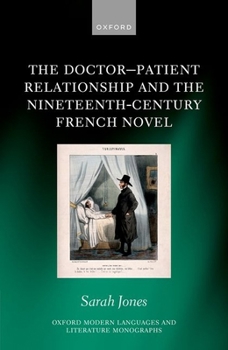The Doctor-Patient Relationship and the Nineteenth-Century French Novel
The Doctor-Patient Relationship and the Nineteenth-Century French Novel analyses the representation of the doctor-patient relationship in the nineteenth-century French novel, notably in the words of Balzac, Sand, Stendhal, and Zola. It argues that the doctor-patient relationship is represented in these novels as a site of interpersonal negotiation wherein the meaning of medical authority, embodied experience, and the spectre of illness and pain are mediated and reimagined. This book highlights how the doctor-patient relationship is often idealized by the novel, wherein the doctor is characterised as a both dedicated to his patients and local community, as well as being a God-like master of life, death, and medical knowledge. The volume suggests that the doctor-patient encounter is often depicted as a separate, although inherently related, concept that undermines this idealisation of medical relationships. The doctor-patient encounter thereby questions the hegemonic power of medical practitioners over their patients by pointing towards how novels depict patients as resisting and even manipulating their doctors. The book identifies and explores other important themes within the doctor-patient relationship such as the medical gaze (regard m dical), power relationships, and the use of embodied metaphor. In particular, the book highlights how the doctor-patient relationship is often a confrontation between scientific knowledge and the experience of gender and disability. The book's conceptual framework is derived from the critical medical humanities, and the volume revitalises and reframes the doctor-patient relationship by considering the intrinsic slippage between idealised relationships and critical encounters. The book uses close readings of its corpus to understand how medical practice is debated and undermined concurrently with its idealisation. It places literary works within a new historical context by reading across novels within their medical and scientific context, and situates them for the first time in the intellectual context of the critical medical humanities. The book points forward to how nineteenth-century French novels can reform how the critical medical humanities views the medical relationship, and the potential impact on real-world patients.
Format:Hardcover
Language:English
ISBN:0198893795
ISBN13:9780198893790
Release Date:April 2025
Publisher:Oxford University Press, USA
Length:240 Pages
Customer Reviews
0 rating





